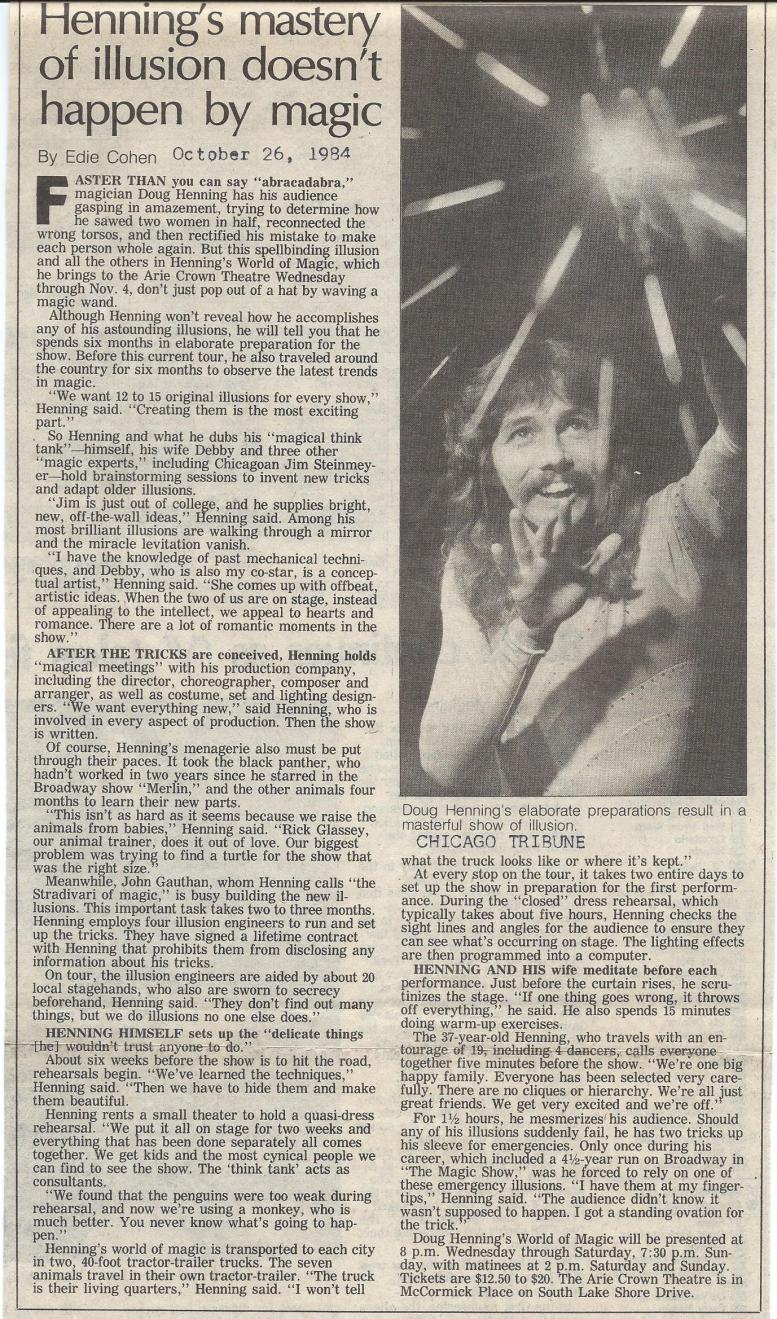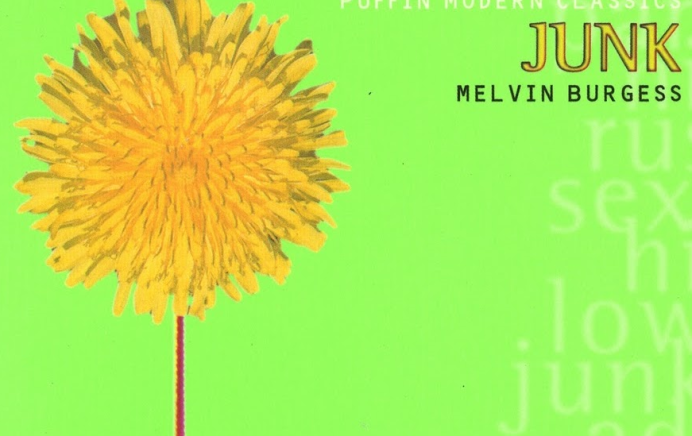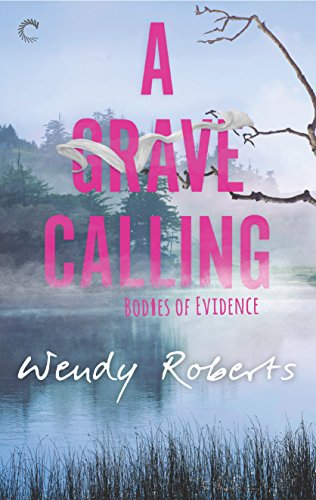“Once upon a time…that’s how it always begins.”
That is how Cornelia Funke ends the opening chapter of Reckless: The Petrified Flesh, which is incidentally also titled “Once Upon A Time”. Is it any surprise then that the story is inspired by fairy tales? Specifically, the Grimm Fairytales.
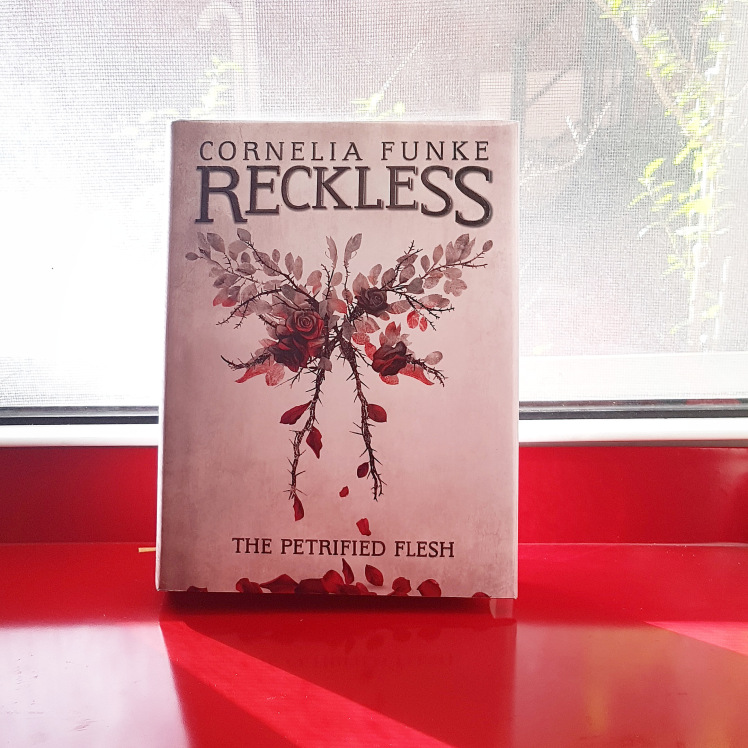 Reckless: The Petrified Flesh by Cornelia Funke
Reckless: The Petrified Flesh by Cornelia Funke
I first read the book (back then it was just Reckless) around 2011. Cornelia Funke had already become a favourite with her Inkworld series, and I was excited to read her first novel since. It didn’t disappoint. But the wait for the next one in the series was a long one for me in India, and I only read Fearless (inspired by English and French fairytales) a few years later. In late 2015, just a few days after I found out why the English translation for Heartless (inspired by Eastern European fairytales), the third in the series, was delayed, I also found out that Cornelia was coming to the 2016 Jaipur Literary Festival in January.
You can read about my experience here, but it won’t tell you how I got to meet her and talk to her one-on-one, and how she was so lovely, recognised me from Twitter, and even gave me a signed bookmark apart from signing my copy of Reckless. It won’t tell you how I got to ask her a question about the Mirrorworld series at the end of her session, or how I needed all this at a difficult, uncertain time in my life. And it won’t tell you how much or why I love the series. So, I was very excited when Breathing Books (the publishing house Cornelia started in September 2015 with Matthew Cullen, the co-founder of Mirada, a multimedia storytelling company from Los Angeles) sent me a copy of Reckless: The Petrified Flesh for review.
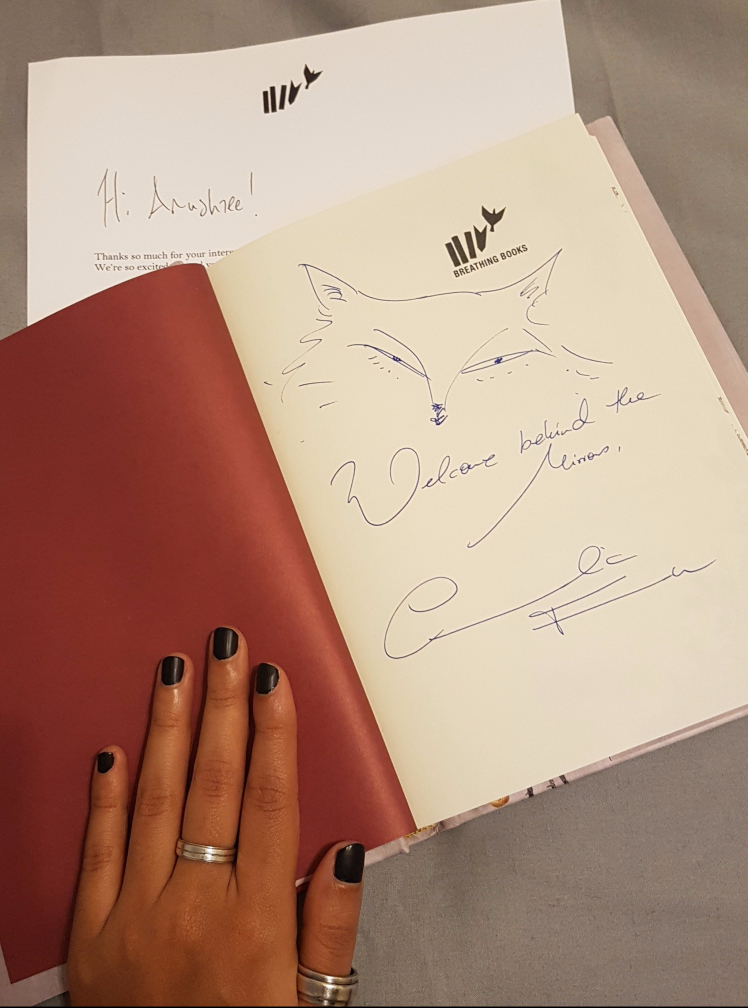 Thanks, Breathing Books!
Thanks, Breathing Books!
A unique aspect of this is that Cornelia Funke has not only republished the three titles from the series and included their European subtitles (The Petrified Flesh, The Living Shadows and The Golden Yarn), but she has also revised the first two. So, reading this book for the review hasn’t been just refreshing my memory, and it’s added to my enjoyment of it. Some parts that had felt a bit stilted in the previous iteration now read stronger, others fit better, some adding needed layers with their clarification. Overall, I’d say that it was an interesting but good decision.
But, back to the story. The book is mostly set in the imaginary Mirrorworld which is a representation of our 19th century world, except that well, there’s magic, and all the fairy tales, myths and folk-tales we have grown up with are a reality. The first person we meet is twelve-year-old Jacob Reckless. It is night time, in our world, and Jacob is awake even as the rest of his house sleeps – his younger brother, Will and his mother. And straight away, there’s atmosphere, a sense of place and character with sentences like “It was like a black cloak woven from freedom and danger, its darkness filling the rooms with the whisper of forgotten stories, of people who had lived in them long before he and his brother had been born.” You know you’re in the hands of a storyteller, someone who takes care with their words and paints pictures and feelings until you can see and feel them as intensely as if all of it was happening to you.
Jacob and Will’s father has mysteriously disappeared, and his older son wants nothing more than to find him, as if turning back time would also turn back the experiences of a fractured family with no answers, no closure; only unresolved hurt and the ways in which each individual person copes. Jacob sneaks into his father’s study every night, not quite sure what he hopes to find. Until he comes across a cryptic message hidden in one of his father’s books and realises the old, ornate mirror hanging on one wall of the study is a gateway to another world…
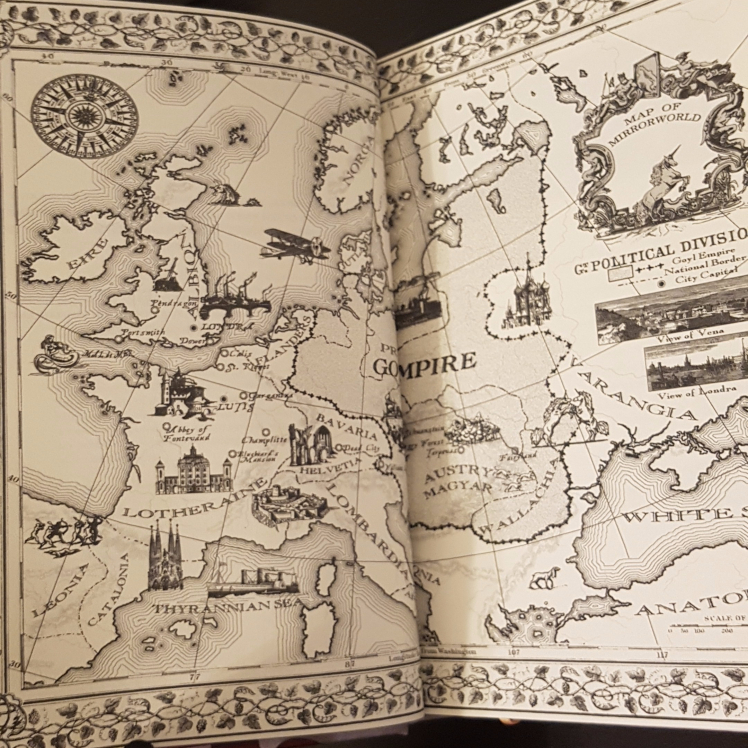 Who doesn’t love maps?
Who doesn’t love maps?
The story picks up again years later, when Jacob is already 24 and a veteran of trips to the Mirrorworld. One day when Jacob, in his hurry to return, is careless about locking the study door, Will follows him there and is subject to a goyl attack. Goyls are a race of humanoids with stone skin. Because of the curse created for them by The Dark Fairy, who is their new king, Kami’en’s lover, their victims start growing a stone skin of their own once attacked, the petrified flesh, until the irreversible transformation is complete, and everything human and soft and vulnerable in them is lost. Kami’en has just won a war against Therese of Austry, and there’s political instability, as well as continued rising tensions between the humans and the goyls.
Goyls come in all kinds of stone – onyx, malachite, carnelian, jasper, moonstone. But never jade. And yet, that’s the stone slowly taking control of every cell in Will’s body. The Jade Goyl. A fairytale in a world built from fairytales. A hero born from “glass and silver and a Fairy’s magic” who was destined to guarantee immortality to the King, the jade running through his skin like a promise.
So not only are the Reckless brothers and their motley crew racing against time to find the cure to Will’s problem, they are also running from the Goyl patrols sent out specifically to bring back their saviour, from anyone they come across on the road who is willing to risk their life in exchange for the bounty on Will’s capture. But unlike other adventure and fantasy stories, this isn’t a quest for glory, treasure, or even to save the world. This is about being willing to sacrifice everything just to save one person even though you know magic and happiness always comes at a price. But he’s your baby brother, and you love him no matter how complicated your relationship has become, and more tellingly, you feel guilty for leaving him and your mother for extended periods of time. (“Guilt is a strong motivator, sometimes even stronger than love.”)
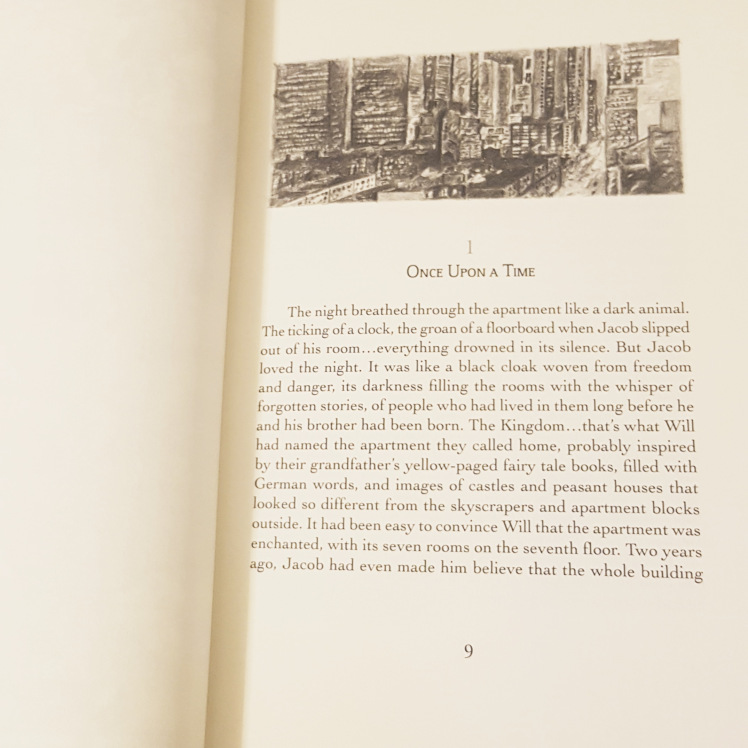 Once upon a time
Once upon a time
Jacob and Will are named after the Grimm Brothers, Jacob and Wilhelm. Jacob is stubborn to a fault, but equally loyal, and constantly battles the demons of his choices, his feeling of suffocation in our world and the need to escape that led him to the Mirrorworld, though initially it was because of his desire to find his father. He’s convinced himself that caring only hinders him, especially in this world where the fairy tales from ours are true, and there’s plenty of adventure to distract him from everything he doesn’t want to face (“He always yearned for unknown places, secrets revealed, treasures found). When his worlds collide, Jacob’s increasingly forced to confront parts of himself and feelings he thought he had buried deep enough.
Will, on the other hand, seems wonderfully uncomplicated in contrast. He’s open, friendly, caring, not afraid to be vulnerable, and Jacob, his fearless big brother, still has his blind trust. (“Jacob will find a way. He always does.”) Until the stone spreading through his veins strips away all the parts that make him himself, and leaves bare only the pain at always being left behind and lied to, the anger at having to deal with their mother’s terminal illness without Jacob, of carrying the burden of the loss on his own, in addition to the sense of abandonment attached to Jacob himself. Feelings that have accumulated through the years swirl beneath their every interaction even though neither might be immediately aware of it. As a child, Jacob has always fought Will’s battles and stood up for him against all the bullies who taunted him for being too gentle, too nice, too soft. Now, Will’s transforming, and there’s an increasing part of him that wants to be a goyl, to forget all his pain and let the jade turn his terrible softness into stone. And as the jade deprives Will of every shred of his humanity, their journey becomes more dangerous, their relationship more complicated.
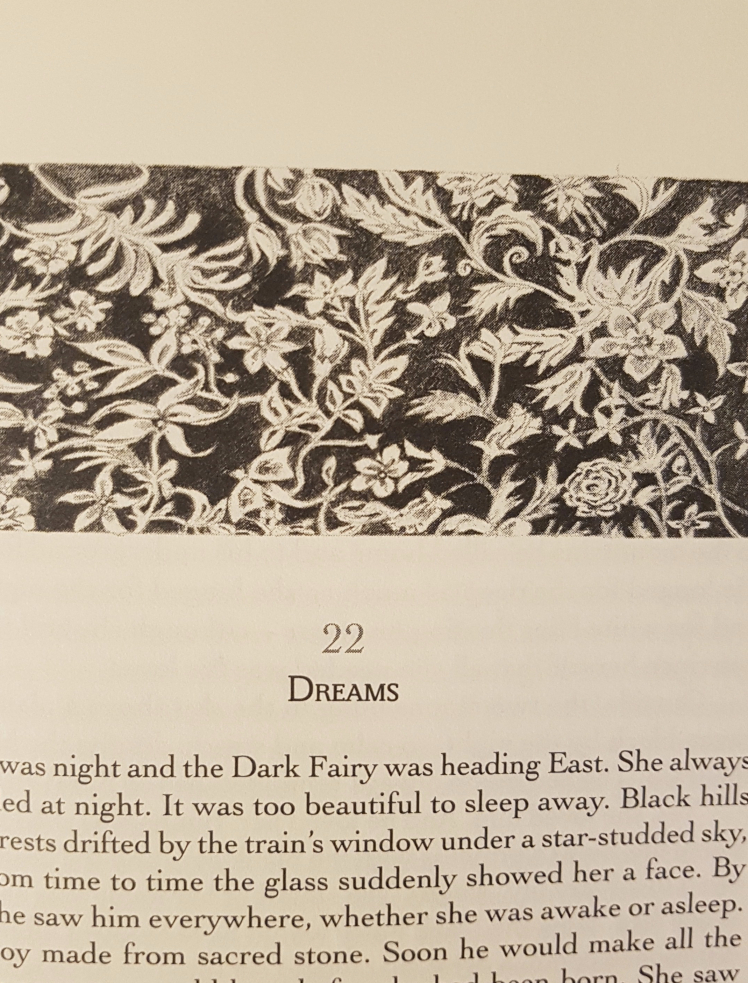 Each chapter has beautiful illustrations by Cornelia herself.
Each chapter has beautiful illustrations by Cornelia herself.
And on this journey, they are accompanied by Fox and Clara. Clara is Will’s girlfriend who has followed him through the mirror at his request. As a medical student, she may not be squeamish about blood or injuries, but there is plenty in the Mirrorworld that requires all her resilience if she wishes to escape this experience relatively unscathed, physically and emotionally, and if she is to help in saving the man she loves. Fox, on the other hand, is from the Mirrorworld. She’s a shape-shifter whom Jacob has saved from a trap, and has since then been his best friend and trusted companion on his treasure-hunting assignments. She’s the only one he trusts and cares for in the Mirrorworld, and they know each other better than anyone. Including the other’s darkness and fears.
The fear that Jacob would leave and never return to the Mirrorworld. That someday, someone might steal the dress and take the fur from her. Fox probably best understands Will’s struggles as his skin is overpowered by the jade, though she herself doesn’t want the skin that Will, and everyone else, is fighting so hard for. For her, human skin makes life complicated. For her, the vixen is her true self, the self that protects her from danger, emotional and physical, and she only reveals herself to people she trusts.
And yet, she cannot escape her fears. Neither, as it turns out, can Jacob. Through the course of this journey, Jacob’s forced to look in the eye his fear of truth, of telling it, facing it; he’s forced to confront questions he doesn’t want the answers to, to face the guilt he feels at Will’s predicament because he believes that it’s the universe’s twisted way of punishing him for running away. (“In fairy tales, the heroes are punished when they run away from a task. The heroes, not their younger brothers…”) He’s even forced to revisit wounds that aren’t even close to healed, in one case actively return to the one place where he had come closest to dying, to later truly losing himself.
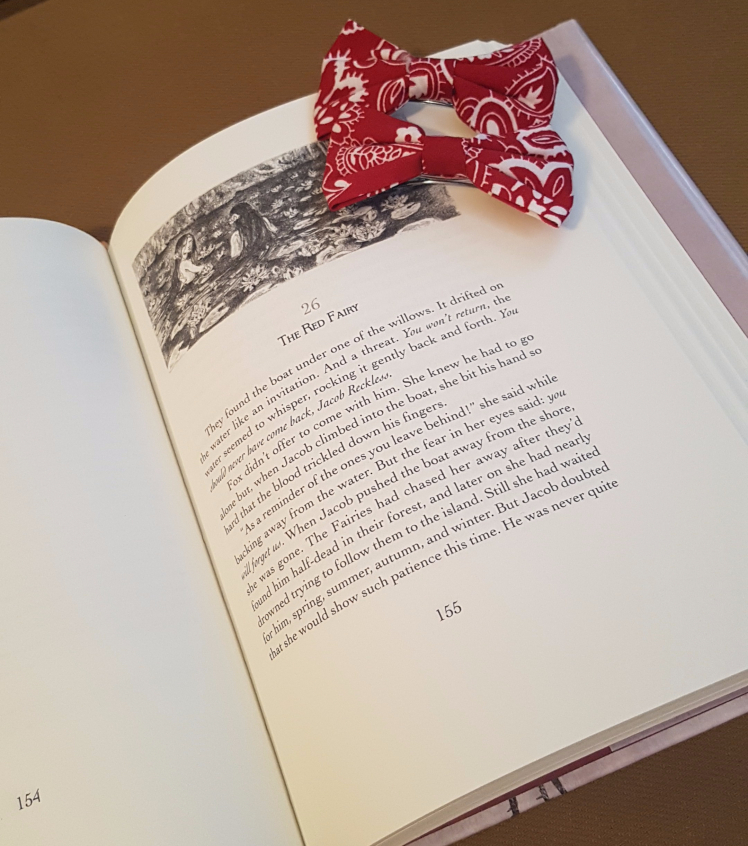
Jacob and Fox have feelings for each other, though neither has explicitly said it to the other person for all the anxieties and other, personal, unresolved emotions blocking their way. Not to mention that when life and death situations abound, it is easier to avoid talking about things, discussing or revealing feelings, even though they simmer just under the surface, following each action like a shadow. But because this is written from multiple points-of-view, we get to reside in their thoughts, and this is one of the strong suits of the narrative. We see the world through their eyes, get better acquainted with the workings of their minds, their hearts, their hopes, wishes, dreams, regrets. Cornelia has added depth to even her most unlikeable characters that humanises them. There are goyls, humans, dwarves, fairies. Each of these characters has different personal motivations that align or conflict with the others’, in a constant fluid state. This also makes it difficult to guess what could happen next, and keeps the plot engaging.
 This is the book without the cover. Easily one of the prettiest books I own.
This is the book without the cover. Easily one of the prettiest books I own.
You have probably figured out by now that this isn’t your standard “happily-ever-after” offering, though the final chapter is titled exactly that. This is a story about brothers and family, about secrets and darkness. This is a story about hard choices, regret, pain, and love. About sword fights, cloaks, daggers, poison, politics, power, magic, dark fairies and blood.
“What was this yearning, tearing at her insides like hunger and thirst? It couldn’t be love. Love was warm and soft, like a bed of leaves. But this was dark, like the shade under a poisonous shrub, and it was hungry. So hungry. It must have some other name, just as there couldn’t be the same word for life and death, or for moon and sun.”
That is exactly why I love it more. There is depth, there is complexity, there is, in short, everything that we cannot escape in our own lives. Just like us, these characters must deal with situations, face emotions, make choices, and make peace with the consequences. But the difference is about a concept that means so much to me that I have it tattooed on me – hope. All the characters you meet are flawed people, fighting their own invisible furies. You watch them stumble, learn, and stumble some more. You’ll watch them be heroes, watch them give in to the darkness, watch them claw their way out, forever changed.
“At some point, all fairy tales lead into the woods. And their heroes first have to get lost to come back with what they have set out to find – if they find it at all.”
But here there is also hope and the possibility of redemption, however hard fought. And it resonates universally because it’s a very human need, this desire for reassurance that things might work out after all, that we might be able to control our destinies through our actions.
 Happily ever after?
Happily ever after?
The world-building is detailed, the descriptions vivid, the language easy to read and beautifully poetic in parts, the characters relatable, and the stakes appropriately high. To top it off, the illustrations sprinkled throughout the book (by Cornelia herself) are gorgeous, and this is hands-down one of the prettiest books I own. The ending perfectly sets up the focal point of the quest that is fated to happen in The Living Shadows, and might not be satisfying for those who like to have things neatly wrapped up. But for me, this was the perfect way to segue into the next book, and since this is a series, there are bound to be overarching narrative arcs getting resolved at different moments of time in different books.
So, what I’m trying to say is, go pick up a copy if you haven’t already, this is a must-read for fans of fantasy. And if you do, drop me a message on here or any of my social media (Instagram – @booksinboston, Twitter – @AnuNandeWriter) to let me know your thoughts.
Thank you for reading, I hope you enjoy it! And a big thanks again to Breathing Books for this opportunity.
Advertisements Share this:

